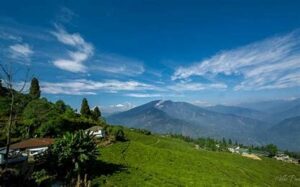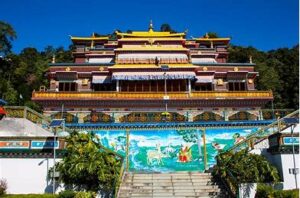Baishagu festival is one of the most significant and joyous festivals celebrated by the Bodo community, an indigenous group from Assam, India. The festival marks the Bodo New Year and is a vibrant celebration of culture, traditions, and the agricultural cycle. Baishagu is not just a time to celebrate the arrival of a new year but also a time to honor nature, family, and the rich cultural heritage of the Bodo people. This blog will explore the history, customs, rituals, and cultural significance of Baishagu Festival, showcasing the deep-rooted traditions of the Bodo community.
What is Baishagu Festival?
Baishagu is the traditional New Year festival of the Bodo people, an ethnic group predominantly found in the northeastern part of India, especially in Assam. It usually falls in mid-April, marking the beginning of the new agricultural season. The festival is celebrated with great enthusiasm and joy, as it symbolizes a fresh start, new hopes, and a time to honor the bonds of community and nature.
The word “Baishagu” derives from the Bodo language, where “Bai” means new and “Shagu” refers to the year. Therefore, Baishagu literally translates to “New Year,” reflecting its significance as the start of a fresh calendar year according to the Bodo community’s agrarian cycle.
The Historical Significance of Baishagu
Baishagu is deeply rooted in the agrarian lifestyle of the Bodo people. As an agricultural community, the Bodos rely heavily on the changing seasons for their livelihood. Baishagu marks the onset of spring, a time when the fields are prepared for sowing, and it is symbolic of new beginnings in both the natural world and the lives of individuals. The festival has been celebrated for centuries, preserving the ancient traditions and customs of the Bodo community. It is a way for the Bodo people to reconnect with nature, express gratitude for the harvest, and pray for a bountiful year ahead.
The festival has not only historical significance but also represents unity and solidarity within the community. It is a time when people come together to celebrate life, culture, and their shared identity. The festival helps maintain cultural continuity, especially in the face of modern challenges and globalization.
The Rituals and Traditions of Baishagu Festival
Baishagu Festival is a multi-day celebration that is full of vibrant customs, rituals, and cultural performances. The rituals vary slightly from region to region within the Bodo community but share a common core of traditions.
1. Preparations and Festivities
As the festival approaches, homes and public spaces are cleaned and decorated. People wear traditional Bodo attire, which includes a “Dokhona” for women and a “Raijang” for men, showcasing the community’s distinctive clothing style. The celebrations typically begin on the first day of the New Year with early morning prayers, offerings, and rituals to honor the gods and seek their blessings for prosperity and a good harvest.
2. The Role of Bwisagu (Sacred Plant)
A significant feature of Baishagu is the worship of “Bwisagu,” a sacred plant. This plant is placed in the center of the celebration, symbolizing the essence of life, growth, and fertility. The plant is decorated with flowers, fruits, and other offerings, and it is revered as a symbol of auspiciousness for the new year. The worship of Bwisagu ties the festival to the agricultural roots of the Bodo people and emphasizes the connection between nature and spiritual well-being.
3. Rituals of Worship
During Baishagu, rituals involving prayers and offerings are an integral part of the celebration. The people gather at community centers or at home to perform sacred rituals. Elders lead these prayers, which involve offerings of fruits, grains, and flowers to seek divine blessings. Specific prayers are recited, invoking prosperity and good health for the coming year.
4. Traditional Dance and Music
Dance and music play a pivotal role in Baishagu celebrations. The Bodo community is known for its folk dances and music, which are integral to the festival. “Bagurumba” is a popular traditional dance performed during the festival. This graceful, rhythmic dance, accompanied by the beats of traditional musical instruments such as the “Jotha” (drums) and “Tharkha” (cymbals), is a visual and auditory celebration of the harvest and agricultural cycle.
Bagurumba is often performed in a circle, symbolizing unity and the interconnectedness of the people. The dance movements mimic the movement of birds and nature, showcasing the Bodo community’s deep respect for the environment. Music and dance provide a lively, spirited atmosphere during Baishagu, with the entire community participating and enjoying the festivities.
5. Feasts and Community Meals
Food plays an essential part in the Baishagu celebrations. Families prepare a variety of traditional Bodo dishes, and large community feasts are organized. A special dish, “Bora rice,” is made from rice and local ingredients, and it is often served with fish, meat, and vegetables. This communal feasting strengthens bonds between family members, friends, and the larger community.
6. The Role of Elders and Community Leaders
In the Bodo community, elders and community leaders hold significant roles during the Baishagu Festival. Their wisdom and guidance are sought to perform the religious rituals and ensure the smooth conduct of the celebrations. Elders are also responsible for telling traditional stories, passing down cultural knowledge, and providing advice to younger generations. This practice helps preserve the language, customs, and traditions of the Bodo people.
Baishagu’s Cultural Significance
Baishagu is more than just a celebration of the new year; it is a celebration of the Bodo people’s rich cultural heritage. The festival is a reflection of the Bodo community’s values of unity, respect for nature, and strong family bonds. Through rituals, dance, and music, Baishagu reinforces the connection between the people and their land. The festival is also a way of maintaining cultural identity in a rapidly changing world, where globalization threatens to dilute traditional practices.
In a broader sense, Baishagu is a celebration of life itself—its cyclical nature and the eternal relationship between the people and the earth. It is a reminder of the importance of the environment and the agricultural cycle in the lives of the Bodo people. The festival instills a sense of pride in Bodo traditions and ensures their continuity for future generations.
Conclusion: A Time for Renewal and Celebration
Baishagu Festival is a vibrant and colorful celebration that captures the essence of the Bodo community’s identity, culture, and values. It is a time for family gatherings, honoring traditions, and rejoicing in the bounty of nature. As a festival that celebrates new beginnings, Baishagu serves as a reminder of the importance of community, the agricultural cycle, and the deep connection between the Bodo people and their environment. By embracing this celebration, the Bodo people continue to preserve their unique cultural heritage and pass it on to the next generation.
For those who are fortunate enough to witness Baishagu, it is an unforgettable experience that showcases the joy, warmth, and beauty of the Bodo community. Whether through traditional dances, prayers, or the sharing of meals, Baishagu represents a time for renewal, reflection, and above all, the celebration of life.




